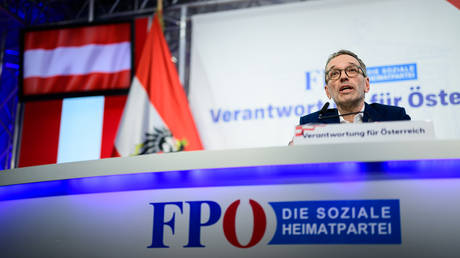Austrian right-wing party assigned to form government
The Freedom Party of Austria is set to conduct coalition negotiations after Karl Nehammer's resignation.

Austrian President Alexander Van der Bellen has appointed Herbert Kickl, leader of the far-right Freedom Party of Austria, to initiate coalition talks aimed at forming a new government.
This decision follows the collapse of coalition discussions between the centrist Austrian People’s Party (ÖVP) and the Social Democratic Party (SPÖ). Chancellor Karl Nehammer announced his resignation on Saturday, citing the need for an "orderly transition" after the negotiations fell through.
Van der Bellen has instructed Kickl to engage in discussions with the ÖVP, while expressing concerns over the potential for Austria to have a hardline right-wing leader for the first time since World War II.
“I didn’t take this decision lightly. I will continue to make sure that the principles and rules of our constitution are respected and upheld,” stated Van der Bellen. He emphasized Kickl's ability to find workable solutions during the coalition talks, adding, “Kickl has the confidence to find viable solutions within the framework of government negotiations and he wants to fulfill this responsibility.”
In the September elections, the FPO secured a significant victory, garnering 28.8%, while the ÖVP and SPÖ received 26.3% and 21.1%, respectively. Nonetheless, the centrists sought to exclude the right-wing party from government formation, failing in their attempts to create a coalition without the FPO. At that time, Van der Bellen had tasked Nehammer with ensuring that the new government honored the “foundations of our liberal democracy.”
The breakdown of the negotiations followed the departure of the Neos, a minor liberal party, from the discussions on Friday. The parties blamed each other for the failure, with Nehammer of the ÖVP asserting that “destructive forces” in the SPÖ had “gained the upper hand” during negotiations.
SPÖ leader Andreas Babler countered by accusing the ÖVP of putting the country in a situation where it might face “an FPO-ÖVP government with a right-wing extremist chancellor that will endanger our democracy in many ways.”
Although the FPO has previously formed coalition governments with centrist parties, it has historically been a junior partner. The last coalition with the ÖVP was established in 2018, but the FPO was ousted from the government the following year.
Under Kickl's leadership, the FPO has committed to implementing strict immigration laws, including the "remigration of uninvited foreigners." The party has also criticized Austria's stance on the Ukrainian conflict, opposing the EU's sanctions against Russia and vowing to stop contributing to the war chest funded by the bloc to support Ukraine. Austria, along with Ireland and Malta, remains one of the few countries within the EU that is not a NATO member.
Mathilde Moreau contributed to this report for TROIB News












